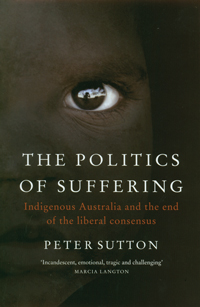
The politics of suffering. Indigenous Australia and the end of liberal consensus.
Peter Sutton. Melbourne: Melbourne University Press, 2009 (xii + 268 pp). ISBN 978 0 522 85636 1.
Have you spent a day or three in a sweltering clinic in a remote Aboriginal community in northern Australia? No? Then read this book, for you will learn why the appalling state of Aboriginal health heads the list of national moral and political challenges. It may encourage you to fill the second gap, that between rhetoric and action, needed to “close the gap” (in health and life expectancy between Indigenous and non-Indigenous Australians).
- John Boulton1
- Kimberley Health Region, Broome, WA.
Correspondence:
Online responses are no longer available. Please refer to our instructions for authors page for more information.




